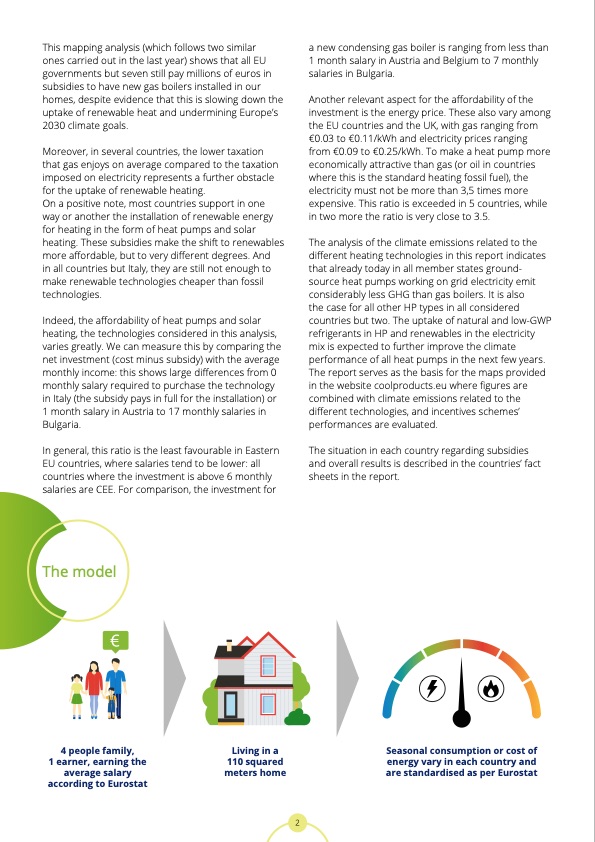
PDF Publication Title:
Text from PDF Page: 002
This mapping analysis (which follows two similar ones carried out in the last year) shows that all EU governments but seven still pay millions of euros in subsidies to have new gas boilers installed in our homes, despite evidence that this is slowing down the uptake of renewable heat and undermining Europe’s 2030 climate goals. Moreover, in several countries, the lower taxation that gas enjoys on average compared to the taxation imposed on electricity represents a further obstacle for the uptake of renewable heating. On a positive note, most countries support in one way or another the installation of renewable energy for heating in the form of heat pumps and solar heating. These subsidies make the shift to renewables more affordable, but to very different degrees. And in all countries but Italy, they are still not enough to make renewable technologies cheaper than fossil technologies. Indeed, the affordability of heat pumps and solar heating, the technologies considered in this analysis, varies greatly. We can measure this by comparing the net investment (cost minus subsidy) with the average monthly income: this shows large differences from 0 monthly salary required to purchase the technology in Italy (the subsidy pays in full for the installation) or 1 month salary in Austria to 17 monthly salaries in Bulgaria. In general, this ratio is the least favourable in Eastern EU countries, where salaries tend to be lower: all countries where the investment is above 6 monthly salaries are CEE. For comparison, the investment for a new condensing gas boiler is ranging from less than 1 month salary in Austria and Belgium to 7 monthly salaries in Bulgaria. Another relevant aspect for the affordability of the investment is the energy price. These also vary among the EU countries and the UK, with gas ranging from €0.03 to €0.11/kWh and electricity prices ranging from €0.09 to €0.25/kWh. To make a heat pump more economically attractive than gas (or oil in countries where this is the standard heating fossil fuel), the electricity must not be more than 3,5 times more expensive. This ratio is exceeded in 5 countries, while in two more the ratio is very close to 3.5. The analysis of the climate emissions related to the different heating technologies in this report indicates that already today in all member states ground- source heat pumps working on grid electricity emit considerably less GHG than gas boilers. It is also the case for all other HP types in all considered countries but two. The uptake of natural and low-GWP refrigerants in HP and renewables in the electricity mix is expected to further improve the climate performance of all heat pumps in the next few years. The report serves as the basis for the maps provided in the website coolproducts.eu where figures are combined with climate emissions related to the different technologies, and incentives schemes’ performances are evaluated. The situation in each country regarding subsidies and overall results is described in the countries’ fact sheets in the report. The model 4 people family, 1 earner, earning the average salary according to Eurostat Living in a 110 squared meters home Seasonal consumption or cost of energy vary in each country and are standardised as per Eurostat 2PDF Image | GREEN HEAT FOR ALL

PDF Search Title:
GREEN HEAT FOR ALLOriginal File Name Searched:
Green-heat-FS_v6.0indd.pdfDIY PDF Search: Google It | Yahoo | Bing
CO2 Organic Rankine Cycle Experimenter Platform The supercritical CO2 phase change system is both a heat pump and organic rankine cycle which can be used for those purposes and as a supercritical extractor for advanced subcritical and supercritical extraction technology. Uses include producing nanoparticles, precious metal CO2 extraction, lithium battery recycling, and other applications... More Info
Heat Pumps CO2 ORC Heat Pump System Platform More Info
| CONTACT TEL: 608-238-6001 Email: greg@infinityturbine.com | RSS | AMP |